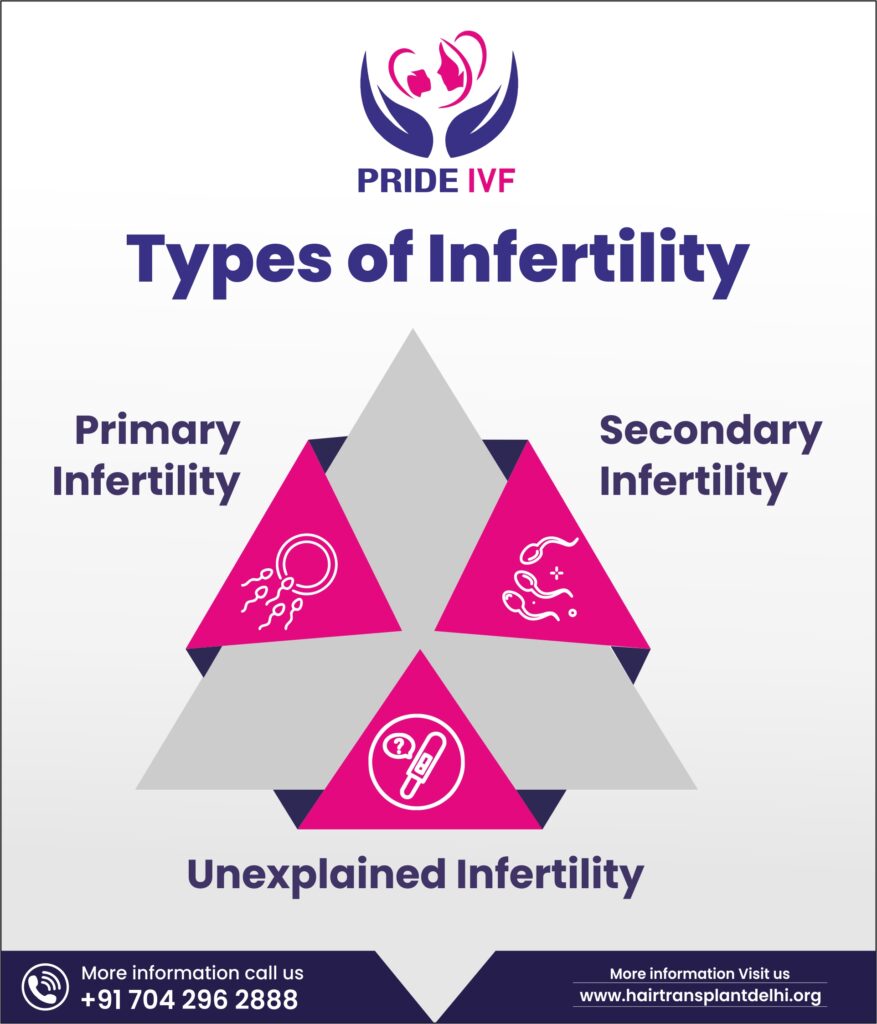Bringing a new life into the world is a cherished dream for many couples, but for some, it can be an unexpectedly challenging journey. Infertility, the inability to conceive despite regular, unprotected intercourse, affects millions of people worldwide. Understanding the meaning of infertility and different types of infertility is crucial for those navigating this path, as it can pave the way for accurate diagnosis and personalized treatment options.
#There are 3 types of infertility like primary, secondary and unexplained. In this blog, we will delve into the various types of infertility in both men and women, shedding light on the complexities of this delicate issue.




Primary Infertility
Imagine the longing for parenthood, the desire to hold a little one in your arms, and the joy of creating a family. For some, this dream seems to remain just out of reach. Primary infertility is a term that describes the inability to conceive despite trying for at least a year without success.
Various factors can contribute to primary infertility. In women, ovulation disorders may disrupt the release of mature eggs, while men may face challenges like low sperm count or mobility issues. Additionally, structural abnormalities in either partner’s reproductive system can present hurdles.
Secondary Infertility
For couples who have been blessed with children in the past, the struggle to conceive again can be deeply disheartening. Secondary infertility refers to the difficulty in achieving subsequent pregnancies after having one or more children.
Causes of secondary infertility may include the age-related decline in fertility, complications from previous pregnancies or childbirth, and changes in reproductive health over time.
Male Infertility
-
Sperm Disorders
Sperm quality plays a crucial role in fertilization. Low sperm count, poor motility, and abnormal morphology are common sperm-related issues that can lead to male infertility. Lifestyle factors, such as smoking and excessive alcohol consumption, can also impact sperm health. Fortunately, intrauterine insemination (IUI) and in vitro fertilization (IVF) present viable options for couples affected by sperm disorders.
-
Testicular Disorders
The testes are responsible for sperm production, and any disorders affecting them can lead to infertility. Conditions like varicocele, infections, and hormonal imbalances can hamper sperm production. Semen analysis (Also Read: Semen analysis test cost) and hormone assays serve as diagnostic tools to identify these issues. Treatments, including surgical interventions, are available to address testicular disorders.
Female Infertility
-
Ovulatory Disorders
At the heart of conception lies ovulation, the release of a mature egg from the ovaries. However, some women experience ovulatory disorders, hindering this crucial process, and causing female infertility. Conditions such as Polycystic Ovary Syndrome (PCOS), hypothalamic dysfunction, and thyroid issues can disrupt regular ovulation.
-
Tubal Infertility
The fallopian tubes serve as vital passageways for eggs to travel from the ovaries to the uterus. Any obstruction or damage to these tubes can lead to tubal infertility. Pelvic inflammatory disease and endometriosis are common culprits behind tubal issues. To assess tubal patency, healthcare providers use a test called Hysterosalpingography (HSG). Go through hysterosalpingography test price.
-
Uterine Infertility
A healthy uterine environment is essential for a fertilized egg to implant successfully. Uterine infertility can be attributed to various factors, including the presence of fibroids, polyps, or structural abnormalities within the uterus. Through diagnostic procedures like hysteroscopy, medical experts can identify these issues and offer treatments like uterine surgeries to enhance the chances of conception at the best fertility clinic in delhi.
Unexplained Infertility
In some cases, despite thorough investigations, the root causes of infertility remain elusive – leading to unexplained infertility. The absence of a clear reason for infertility can be deeply frustrating and challenging to come to terms with.
Couples facing unexplained infertility often need to navigate feelings of uncertainty and disappointment. Emotional support and counseling become crucial aspects of their journey as they seek ways to cope with the unknown.
Recurrent Pregnancy Loss (RPL)
Recurrent Pregnancy Loss (RPL), also known as recurrent miscarriages, is a heart-wrenching experience for couples. It’s defined as the loss of two or more consecutive pregnancies before 20 weeks of gestation. Genetic factors, uterine abnormalities, hormonal imbalances, immunological factors, and lifestyle and environmental influences can contribute to RPL. The emotional toll of going through multiple losses can be overwhelming, and couples dealing with RPL require not only medical attention but also emotional support and counseling.

Secondary Causes of Infertility
Infertility can also be caused by various secondary factors. Chronic illnesses, such as diabetes or autoimmune disorders, can affect fertility. Thyroid disorders, both hypothyroidism, and hyperthyroidism, can impact menstrual regularity and ovulation. Sexually transmitted infections (STIs) can lead to pelvic inflammatory disease, which can cause fallopian tube blockages.
Weight-related issues, such as obesity or extreme weight loss, can disrupt hormonal balance and interfere with ovulation. Additionally, stress and emotional well-being can influence fertility, highlighting the need for a holistic approach to infertility treatment.
Lets get started
Age and Infertility
Age is a critical factor in fertility, both for women and men. As women age, their ovarian reserve and egg quality decrease, making conception more challenging. Additionally, older women are at a higher risk of pregnancy complications, including gestational diabetes and preeclampsia. For men, advancing age can lead to a decline in sperm quality and quantity, which can affect fertility and increase the risk of genetic abnormalities in offspring. Family planning considerations should take age-related fertility decline into account.
Psychological and Emotional Aspects of Infertility
Infertility is not just a physical condition; it takes an immense toll on the emotional well-being of the couples involved. The monthly rollercoaster of hope and disappointment can be emotionally draining. Coping strategies, such as open communication within the couple and seeking professional counseling, are essential for navigating this challenging journey. Support groups and connecting with others experiencing infertility can also provide comfort and understanding.
Treatment Options for Infertility
Assisted Reproductive Techniques
When natural conception remains elusive, assisted reproductive techniques step in to offer hope. Intrauterine Insemination (IUI) involves placing carefully prepared sperm directly into the uterus, aiding the sperm’s journey to meet the egg. In Vitro Fertilization (IVF) is a widely known procedure where eggs and sperm unite in a laboratory setting before implanting the embryo into the uterus.
Intracytoplasmic Sperm Injection (ICSI) is a ray of light for those facing male infertility, as it involves directly injecting a sperm into the egg to facilitate fertilization. For some, the path to parenthood may involve using donor eggs or sperm, providing viable opportunities for conceiving a child, and creating a loving family.
Lifestyle Modifications to Improve Fertility
Beyond medical interventions, a few lifestyle tweaks may work wonders in promoting fertility. Nourishing the body with a balanced diet rich in essential nutrients can enhance reproductive health. Stress management plays a crucial role too, as high-stress levels can disrupt hormonal balance. Finding solace in mind-body practices like yoga and meditation can pave the way to a calmer, more receptive state for conception.
Psychological Support and Counseling
The emotional toll of infertility should never be underestimated. Coping with feelings of grief, frustration, and anxiety is part of the journey. Understanding the different types of infertility in females and types of infertility in males can help shed light on the specific challenges individuals may face. Seeking the guidance of experienced counselors can provide much-needed support and equip couples with effective coping mechanisms.
Open communication and emotional resilience are vital in navigating the decisions surrounding fertility treatments, and by recognizing the unique aspects of each partner’s fertility struggles, couples can better support each other on this challenging path.
Conclusion
Infertility is a multifaceted challenge that affects individuals and couples in unique and profound ways. By understanding the different types of infertility and the treatment options, we can foster a greater sense of empathy and support for those on this challenging path. With medical advancements and compassionate care at International Pride IVF Centre in delhi, parenthood’s dream becomes a reality. Seek support from the center for personalized care and cutting-edge treatments.
Together, we offer understanding, compassion, and encouragement, making parenthood achievable. Let’s spread awareness, extending hope and assistance to those on this journey. Parenthood’s joy is within reach with the right support. Reach out, and make dreams come true.
FAQ
What are the types of infertility in females?
Female infertility can be classified into two main categories: primary infertility and secondary infertility. A woman diagnosed with primary infertility has not been able to conceive after engaging in regular, unprotected sexual activity for a minimum of one year. A woman who has previously become pregnant but is unable to conceive again is said to have secondary infertility. Numerous conditions, including ovulation disorders, obstructed fallopian tubes, uterine anomalies, and age-related variables influencing egg quality, can lead to female infertility.
What are the causes of infertility?
Numerous reasons can lead to infertility in both men and women. Ovulation abnormalities (such polycystic ovarian syndrome) in females, endometriosis, uterine fibroids, and ageing are among the causes. Male infertility is frequently brought on by obstructions in the reproductive system, low sperm counts, and poor sperm motility. Both male and female infertility can also be caused by lifestyle choices such as smoking, binge drinking, being overweight, and experiencing stress. Infertility can sometimes be caused by unknown causes or genetic factors.
What are the types of infertility in males?
There are three primary categories of male infertility: testicular, post-testicular, and pre-testicular. Pre-testicular infertility is the term used to describe hormonal problems or other illnesses that impact the ability to produce sperm. Problems with the testicles themselves, such as low sperm count, poor sperm quality, or hereditary diseases, are linked to testicular infertility. Problems like ejaculatory dysfunction or obstructions in the reproductive canal that hinder sperm from ejaculating properly are associated with post-testicular infertility.
What are the infertility causes in males?
Male infertility is frequently caused by abnormal sperm morphology, low sperm motility, and low sperm count. Male fertility can also be impacted by genetic disorders such Klinefelter syndrome, hormonal abnormalities, and testicular injury. Moreover, poor lifestyle choices including smoking, binge drinking, abusing drugs, and being around pollutants can have a detrimental effect on sperm production. Additional reasons include illnesses affecting the reproductive organs and varicocele, which are swollen veins in the scrotum.
What is primary infertility?
When a couple has not conceived after at least a year of unprotected sexual activity and has never conceived before, it is referred to as primary infertility. Both men and women may have this kind of infertility, which is frequently brought on by problems including irregular ovulation, low sperm counts, blocked fallopian tubes, or hormonal abnormalities. Couples pursuing reproductive treatments frequently worry about primary infertility.
What are the treatment of infertility?
Treatments for infertility differ based on the underlying cause. Gonadotropins and clomiphene are common drugs used to induce ovulation in female infertility patients. Anatomical abnormalities in the reproductive organs may be corrected surgically. For more complicated cases, assisted reproductive technologies (ART) like intrauterine insemination (IUI) and in vitro fertilisation (IVF) are frequently advised. Treatments for male infertility may involve lifestyle modifications, medication, and surgery to remove obstructions or varicocele. ART methods such as IVF with intracytoplasmic sperm injection (ICSI) can be employed when the sperm count is low.
How to test if a woman is infertile?
Numerous procedures are carried out to ascertain a woman’s infertility, such as follicle-stimulating hormone and luteinizing hormone blood testing, reproductive organ ultrasound imaging, and ovulation monitoring. A laparoscopy can be done to find problems like endometriosis or scar tissue, while a hysterosalpingogram (HSG) can be used to assess the health of the uterus and fallopian tubes. These examinations aid in determining the root causes of infertility and direct the course of treatment.
What are the two main types of infertility?
Primary infertility and secondary infertility are the two basic forms of infertility. Primary infertility is the inability of a couple to conceive, whereas secondary infertility is the inability to conceive after a previous pregnancy. Both kinds may be brought on by a number of variables that impact one or both couples, such as sperm abnormalities, age-related declines in fertility, or difficulties with ovulation.
What are the three most common infertility techniques?
The three most common infertility treatment techniques are Ovulation induction, Intrauterine insemination (IUI), and In vitro fertilisation (IVF).




